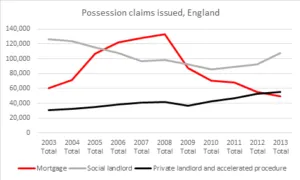Blanket Insecurity
Published: by Shelter
Looking at the latest data release from the Ministry of Justice (MoJ), it caught my eye that possession claims in the private rented sector have now overtaken those made on mortgaged properties.
A possession claim is the first step in a legal process which can end with the loss of a home. And in 2013, a total of 212,667 of them were issued through county courts in England. Just over half of these – nearly 108,000 – were on behalf of social landlords. Of the remainder, 49,708 were made on behalf of mortgage lenders and 55,157 on behalf of private landlords or through the accelerated possession procedure.
It’s the accelerated procedure which is key here. It occupies its own line on the MoJ data as technically it can be used by either social or private landlords. However, it can only be used where the tenancy the landlord is trying to end is an assured shorthold tenancy (AST) or a statutory periodic tenancy – and these are almost exclusively the preserve of the private sector.
The other thing about the accelerated procedure is that as long as the landlord has followed the rules, the tenant has no defence – they don’t need to have done anything wrong in order for the landlord to evict, so having done nothing wrong is not a defence – and cases will normally not even require a court hearing. A home-owner receiving a possession claim for mortgage arrears or a social tenant receiving one for rent arrears will often have the opportunity of negotiating a chance of staying in their home. However, it’s pretty much a given that every tenant receiving a claim through the accelerated procedure will be having to move on before long – no matter how clean, well-behaved and up-to-date with the rent they are.
Another worrying detail is that unlike in the social rented and mortgage sectors, the number of repossession claims in the private rented sector is a significant underestimate of the total number of homes at risk. Think about it – more secure tenancies, or ownership with a mortgage, require court action to get people out of their homes. But in our insecure private rented sector, many more will leave their homes when given notice by their landlord – whether they’re ok with leaving or not – without the matter ever coming to legal action.
It’s great to see that the numbers of home-owners at risk of losing their homes is dropping, thanks to a combination of forbearance by lenders and a continuing low interest rate environment – even though the latter can only be temporary. But it’s a worrying sign of the dysfunctional nature of our housing system that the private rented sector should now be the focus of more legal activity than a sector which is nearly twice its size.
The eagle-eyed among you will have noticed that claims are also rising in the social rented sector, and have been doing so since 2010, with a noticeable acceleration in 2013, but that’s a whole other story…
